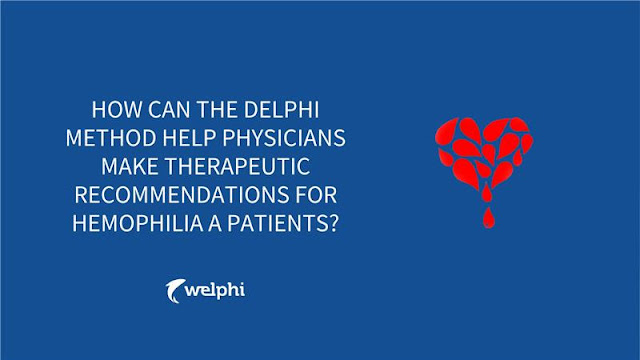The Delphi method is a gold-standard technique
to achieve group consensus. In health care, when treatment protocols are absent
or robust evidence is unavailable, the Delphi method can play a vital role in
facilitating decision-making.
A group of US-based researchers from PRECISIONheor aimed to identify areas of consensus and disagreement among hematologists regarding therapeutic options for patients with severe hemophilia A. The Welphi platform was used to achieve this goal.
How was the study done?
Veeranki and colleagues (2021) brought
together a group of hematologists to gain a broader understanding of management
practices of difficult-to-treat severe hemophilia A without inhibitors.
First, they conducted an extensive
literature review to identify available treatments, advantages, and unmet needs
as well as perceived challenges encountered by physicians who treat patients
with severe hemophilia A without inhibitors.
Then, the study team used Welphi, our online
survey platform that implements the Delphi method in a virtual setting, to conduct
a 3-round web-based Delphi process.
In the first round, 13 clinical experts
reviewed different clinical scenarios designed to reveal their preferences for
a particular treatment option using a scale of 1-100, where 1 was considered a
highly undesirable treatment option and 100 was considered a highly recommended
option. They also ranked factors affecting treatment decision-making. In the
second round, the experts participated in an asynchronous online discussion on
the Welphi platform to debate and review the first round’s findings. Finally, in
the third round, experts were asked to once again answer the initial Round 1 questions
in light of the previous round’s responses.
Results
The experts reached a consensus regarding the
use of factor VIII (FVIII) replacement therapy in combination with emicizumab, an
antibody prophylaxis in the treatment of high-risk hemophilia patients.
This includes the appropriate use of FVIII
in combination with emicizumab during and immediately post-surgery for patients
with elective surgery and episodic FVIII followed by emicizumab for newborns
with post-circumcision bleeding.
Most of the panelists preferred FVIII over
emicizumab due to established evidence on safety and efficacy.
These recommendations complement existing treatment
guidelines and support physicians in the management of hemophilia A patients without
inhibitors.
For further detail, you can access the study publication here. To learn more about our Welphi Platform, visit our website or send us a message!
References:
Veeranki SP, Pednekar P, Graf M, Tuly R, Recht
M, Batt K. A Delphi Consensus Approach for difficult-to-treat Patients with
Severe Hemophilia A without Inhibitors. J Blood Med. 2021 Oct 21;12:913-928.
doi: 10.2147/JBM.S334852. PMID: 34707422; PMCID: PMC8544791.


